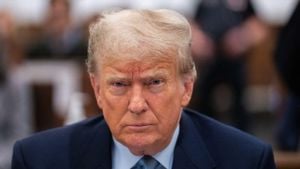Hunter Biden, the son of President Joe Biden, has found himself at the center of intense discussions surrounding the concept of presidential pardons, with experts weighing the potential ramifications of such action. Reports indicate the notion of pardoning Hunter Biden has gained traction amid his legal troubles, including federal tax evasion and illegal possession of firearms stemming from his past drug addiction. But the question remains: would such a pardon truly serve justice, or would it be seen as favoritism by the Biden administration?
Legal experts are divided on the impact of a presidential pardon. Some argue it could be viewed as necessary to uphold the principles of justice and rehabilitation, considering the stigma attached to addiction and the legal challenges Hunter has faced. Others caution against the perception of preferential treatment, highlighting how such actions might undermine public trust, especially during the current political climate where accountability and justice are rallying cries for many Americans.
Hunter's situation is laden with complexity. He has been under investigation for allegedly failing to pay taxes on over $1.5 million from foreign business dealings, and there have been inquiries surrounding his firearm purchase during this tumultuous period. These aspects paint the picture of not just legal complications, but also broader societal challenges involving addiction and recovery. Pardoning him might spark conversations about the fairness of the justice system, especially concerning individuals grappling with similar issues.
Political analysts are quick to point out the potential fallout should Biden decide to pursue this path. Given the existing polarization among voters, particularly among Republican constituents, many view any potential pardon as another example of political nepotism. The Republican National Committee has already reiterated their stance, stating, "A pardon would not only be politically disastrous for the administration, but it could also provoke serious backlash. Voters expect their leaders to be held to the same standards as everyone else." This sentiment rings true, particularly among those who feel Hunter’s actions warrant accountability rather than forgiveness.
On the flip side, proponents of the pardon argue it could symbolize the administration's commitment to addressing addiction through compassion rather than punishment. Hunter Biden's battles with substance abuse have been highly publicized, and his story resonates with many who believe rehabilitation should be prioritized over punitive measures. Advocates argue releasing him from potential criminal consequences could reflect the broader necessity for systemic reform, underlining the importance of empathy rather than vengeance within the legal system.
Some political insiders speculate whether Biden might remain neutral, allowing the judicial process to run its course rather than involving himself directly. This position could serve to avoid both the backlash of appearing biased and the optics of leaving his son without support during such trying times. Biden's administration has consistently aimed to portray itself as aligned with fairness and transparency, especially concerning justice reform, so any move may be carefully calculated.
Another dimension to the discussion surrounds Hunter's business dealings overseas, particularly the controversies involving Chinese, Ukrainian, and other foreign interests. These dealings have generated skepticism and accusations against not just Hunter but also President Biden himself. A pardon might not erase concerns over perceived corruption or conflicts of interest. Instead, it could merely exacerbate existing doubts about the integrity of those ties. Some analysts argue, "This potential pardon is not just about Hunter Biden—it's about how it reflects on the entire administration's ethical stance. Public perception hinges on transparency, and anything perceived as evasive could hinder this administration's broader agenda."
Throughout Hunter's public struggles, he has attempted to establish himself as more than just the president's son, advocating for mental health awareness and engagement through art. He has expressed the transformative nature of art, particularly how it has assisted him on his path to recovery. Some view his artistic pursuits as benefitting young people who face similar battles with addiction and mental health issues. Still, others remain skeptical, questioning how this endeavor aligns with the broader legacy left behind from his previous actions.
Hunter Biden's unique position as the president's son undoubtedly complicates his narrative. Any potential pardon not only impacts his future but could also extend to broader discussions about privilege, rehabilitation, and political accountability. Observers remain watchful as developments continue to emerge, eager to decipher the Biden administration's intentions and their implications.
The debate surrounding the potential pardon of Hunter Biden is potent and packed with moral dilemmas. Will this be seen as justice or privilege? Should his past be forgiven as part of the path toward healing, or should he be held accountable like any citizen? The answers remain uncertain, and as discussions persist, the nation watches closely, unsure of how this chapter of the Biden family saga will conclude but aware of the stakes involved.



